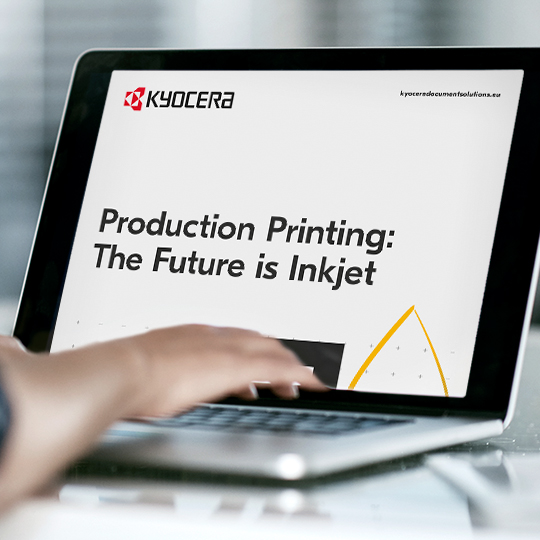Digitalisation is slowly but surely taking over all industries and markets. The printing sector is enthusiastically adapting to confront this transition towards digitalisation, all the while seeking a way to ensure that its traditional modus operandi remains relevant in a digital world.
Although we might expect the need for printers to gradually fall in a world where all content is online, the printing industry has actually been evolving and integrating various technological processes into its everyday operations. This has led to the creation of digital production printing, which opens the door to many new printing opportunities even when the print job has a high number of copies.
Digital printing transfers digitised images and files from a computer onto a printed document. This printing technique is usually limited to professional printing environments in which small-run jobs are printed with high-volume devices or inkjet printers. This is now becoming increasingly common as inkjet digital production printing becomes more widespread with companies openning their eyes to the opportunity that lies before them.
Innovative and disruptive advances in the printing industry, like the latest breakthroughs in inkjet printing, are transforming the printing process as well as increasing the quality of end products. Industries such as commercial printers, book or magazine publishers, and large marketing departments with in-house print rooms are now turning to digital production printing for many reasons.
One of the greatest features that digital production printing and the software that comes with it offers is the ability to customise or personalise content quickly and simply. It allows companies to communicate on a large scale without having to combine a print job across offset and laser or worse, pay for expensive templates. Variable printing allows the user to customise all their prints digitally and easily, instead of having to manually change individual documents one by one.
Marketing, personalised packaging, finance and –utility companies are prime examples of industries that are set to benefit significantly from the latest breakthroughs in digital printing. This is heavily influenced by the fact that these industries greatly rely on the need for content customisation.
The Future is Inkjet
Here’s how personalising printed content can be beneficial to businesses:
Higher revenues
Customers are more likely to react to content that has been customised. Everyone, from potential clients in B2B or B2C environments to employees receiving internal memos, are now used to receiving a large quantity of personalised digital content, so printed documents should also include this feature in order to stay relevant and compete with online formats.
A recent study carried out by One Spot revealed that a brand’s average order value was found to increase by around 5% when personalised content was included, and conversation rates increased by 6%. That’s why having unique printed materials matter in a world where we all demand more from the organisations that we interact with.
Time efficiency
Personalised print can be carried out in a quicker manner with digital production printing than alternative printing options, depending on the volume of documents and the possible modifications that are needed in each print project.
This means that content personalisation can be completed in one single print job automatically through variable data input. There is no longer a need to manually insert each document through the printer one by one, and perhaps at various times, to personalise each desired section.
Make your brand more powerful
Personalising the content that your company distributes can effectively strengthen its brand position and give it the competitive edge, making it more powerful and certainly more successful.
As generations pass, customers are becoming more and more demanding with the content that they receive and digest daily. Customisation is one of the key eye-catching elements that millennials and younger generations are likely to expect when engaging with printed content in the present and near future.
Marketing trends are increasingly focusing on the customer experience and content personalisation in order to make a company more appealing to its audience. It seems to be working, as Qubit research found that 81% of consumers are willing to switch their loyalty for a more personalised experience.
A growing trend
The digital printing market is steadily gaining pace and is set to undergo drastic changes in the coming decade. The overall digital printing market is set to reach 225% of the 2013 value by 2024, according to a new market report by Smithers Pira. This specific market has not yet fully matured, which means that there is ample room for innovation and growth.
The personalisation and customisation options offered by digital printing certainly give this technology the upper hand in today’s fast-paced digital surroundings. Impersonal marketing content will be consigned to the past, as businesses are now learning to stand out from the crowd through the use of digital production printing.

Read the eBook here
Get your own copy of the eBook to learn more about how the future of production printing belongs to inkjet.
